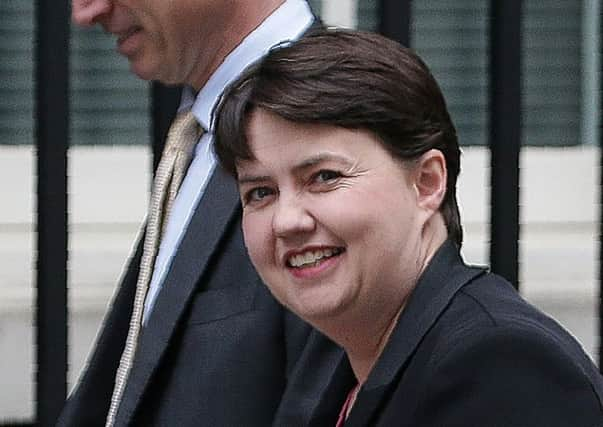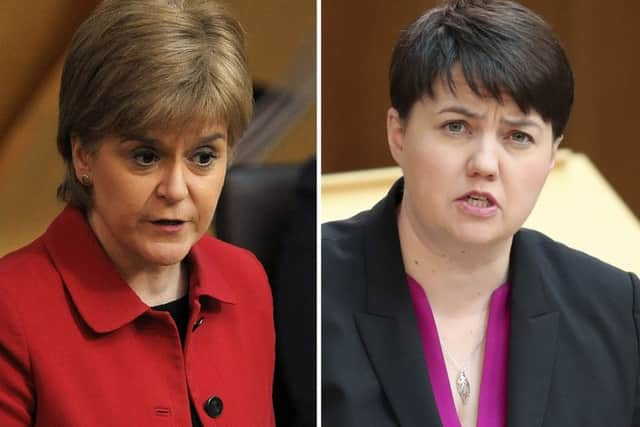Paris Gourtsoyannis: Ruth Davidson's real ambition is to be First Minister


When Pierre Trudeau was battling a tide of Québec nationalism, his greatest rival was not the charismatic leader of the Parti Québécois, René Lévesque. There was no love lost between the pair, but the Canadian Prime Minister’s most difficult political relationship was closer to home.
Robert Bourassa was in Trudeau’s own Liberal Party, and as premier of Québec during the rise of the PQ, he should have been the Prime Minister’s closest ally.
Advertisement
Hide AdAdvertisement
Hide AdBut they were constantly at loggerheads, particularly over whether to accommodate or reject demands to recognise Québec’s cultural distinctiveness.


The old-money, uptown intellectual often struggled to conceal his contempt for a working-class kid who married into wealth.
Trudeau famously responded to Bourassa’s introduction of legislation to protect the French language with the snobby, withering put down: “He’s a hotdog eater.”


Just by looking at the way they fight elections, it’s obvious that Ruth Davidson and Theresa May are very different characters, but their personal relationship doesn’t look at risk of a similar breakdown.
Could the political dynamic between the two most powerful figures in the Conservative Party be starting to resemble the difficult relationship defined by Canada’s federal system?
It sounds that way from the language Ruth Davidson is using since the election result. Yesterday she went further than ever before, saying her 13 MPs would act in the tradition of being a “separate party”, recalling when the Unionist Party was a distinct organisation and brand and would take the Conservative whip at Westminster.
Over the weekend, the story of the election in Scotland was of Ruth Davidson flexing her muscles – and what muscles they are.
At first glance, the Scottish Conservatives are oiled and rippling. If that’s an uncomfortable image, imagine how it makes the Prime Minister feel. She could be out of Downing Street already if it wasn’t for Davidson, who commands a bigger bloc of votes than the Democratic Unionist Party that May is seeking to ally with.
Advertisement
Hide AdAdvertisement
Hide AdThe Scottish Tories’ election performance has led to a renewed bout of speculation from Westminster pundits that Davidson could be a future leader – and, in the current circumstances, saviour – of the Conservative Party.
Davidson haunted the first Westminster lobby briefing after the election, as business got back underway with a first-day-of-term feel.
Did the Prime Minister’s spokesman recognise her calls for an ‘Open Brexit’? Were her MPs expected to toe the line once the Conservatives do hammer out their post-election Brexit plan? And what about those assurances she had demanded on gay rights in Northern Ireland?
Polling on a hypothetical leadership race confirms that Davidson is the second choice behind only Boris Johnson when members are asked who should bail the Conservatives out of their current mess.
It’s hard to see how either of them are the answer.
In Davidson’s case it isn’t just the practical difficulties that need to be overcome – although from the suggested solutions, such as parachuting her into the House of Lords, they are probably insurmountable.
More fundamentally, looking at Davidson’s comments as a power play, designed to make her mark on the UK party and build her profile ahead of a future leadership bid, is missing the point.
All of this is designed for domestic, Scottish consumption.
On the 20th anniversary of the 1997 Labour landslide, I spoke to Lord Forsyth, the last Scottish Secretary to have any company in the House of Commons until David Mundell, today.
He framed a Conservative breakthrough at the general election entirely in terms of how it would increase pressure on the SNP’s domestic record, and act as a stepping stone for the party in Scotland.
Advertisement
Hide AdAdvertisement
Hide AdIf the Tories sent a handful of MPs to Westminster, he said, Davidson’s campaign to be First Minister of Scotland would start the next day. It is right on schedule.
I suspect Davidson isn’t particularly interested in carving up the Conservative Party. She campaigned for the Scottish Tory leadership against a plan to breakaway and rebrand in order to make the party electable again, and since last year, it already is.
Her lobbying for a more consensual, less destructive, middle of the road Brexit will help reshape the Tory approach to leaving the EU, but the electorate have already delivered that course correction.
With the help of other parties, Davidson is simply prodding the government in the inevitable direction. In any case, a decisive break with the UK Government is unlikely: Conservative candidates in Scotland campaigned on the same Brexit prospectus as those in the rest of the UK. They can’t completely disown it.
But come 2021, when the next Scottish Parliament election is held, it will be crucial for Davidson to be able to look voters in the eye and say she’ll stand up to the UK Government, even when it is formed by her own party.
As a message, it is a staple of a devolved political system. Unionists have spent a decade decrying the SNP’s ‘grievance agenda’, and while Davidson’s tone will be very different, her aim will be the same: to demonstrate her readiness to fight Scotland’s corner.
The claim to stand up for Scotland is the only one the SNP can rely on in a Westminster election, and during the past campaign, Davidson was least comfortable when having to defend UK policies. The branch office tag killed Scottish Labour, who had their best days when they were implementing distinctive policies that didn’t get the Tony Blair seal of approval.
There will be more of this to come – and not just on Brexit. If Boris Johnson becomes Prime Minister, insults might follow, too.
